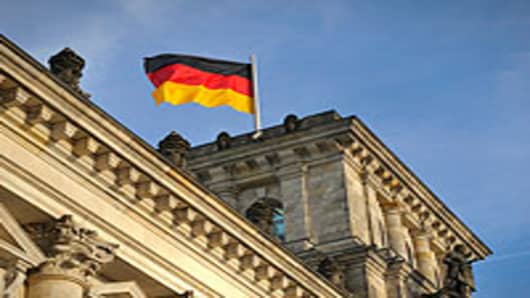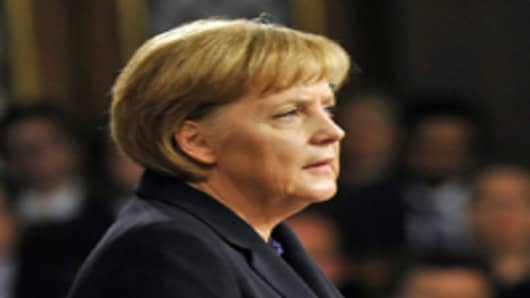Could there really be a "Green" German Chancellor one day? What would that mean? How "green" can Germany get? ... Questions I am being asked rather often these days - even and especially from outside Germany.
These questions come from bankers, managers, analysts.
In short - sorry to be cynical - members of the discerning business public who hitherto had displayed precious little interest in German politics. Period.
Nevermind The Greens! "The Greens? - Bunch of die-hard Socialist treehuggers, aren't they?" .... that, let's be honest, had been the prevailing opinion from foreign observers, especially from the Anglo-American finance community.
Honest. Ah, if only it were that simple. But, you see, German politics and moods never are. Trust me. I should know.
To the uninitiated outsider, German politics might seem a tepid, boring grind of non-transparent layers of government and tiresome consensual coalitions. None of the pizzazz of Westminster debates or Obama Facebook online interviews.
Just endless parliamentary droning following even more endless closed-door committee meetings on the real issues of governing Germany.
Don't be so fooled. There's a lot more going on that meets the headline eye! Back to the Greens.
True, they almost literally started out as "a bunch of tree-huggers" in the late 70s. At a time when the word "Waldsterben" - forest dying - was THE political buzz word of the season.
Wipe that smirk off your face! Yes, us Germans - me included - were shaken to their tree-hugging cores by the shocking news that the German forests were DYING!!! Because of sour rain and pollution.
And the Greens, at that time not really a political party at all, but a "Bürgerbewegung" (a citizens' movement) were the first real voice to be heard to defend the forest in particular and environment at large.
Sneakers' Minister
But that wasn't their only credo. Born from the remnants of what's known in Germany and France as the 68er movement - the Socialist student movement of the 1960s -, the Greens bundled a number of left-wing protest movements.
Sour rain and tree dying was one topic, but it was also the time of NATO twin accord and the planned stationing of American Pershing missiles in Germany.
And let's not forget the nuclear disaster in Chernobyl and its aftermath. Somewhere in a box of memorabilia from my wild and withered youth there surely must be a button sporting the well-known slogan "Atomkraft - nein danke!" (nuclear power - no, thanks!) ....25 years on, it seems many are polishing up those old buttons or buying new ones. Including Angela Merkel.
Anyway, back to then. In the 80s the Greens emerged as the voice for the peace movement, for environmentalists and for immigration and multiculturalism.
Needless to say, the established parties smirked down their noses at this motley troupe of baggy, home-knitted sweater-wearing ex hippies and their apparent political ambitions.
At first. But then there was the day when the Greens made it into a German state parliament (here in Hesse) for the first time and when - later-day Federal Foreign Minister - Joschka Fischer was sworn in as the first Green minister.
"Turnschuh-Minister" (sneakers' minister), they sniggered at the time. Young Joschka appeared in jeans and sneakers in the venerable Hesse parliament when he was sworn in as minister of the environment in 1985.
A Tectonic Shift in the Political Landscape
Shocking! But the simple fact that there was a ministry of the environment in every German state and in the federal government by that time was already a tectonic shift in the political landscape largely owed to the persistent success of the Greens.
Because, as the Greens grew from a protest movement into an electable and elected party, the established powers saw themselves forced to pick up "green" themes - especially the care for the environment.
Henceforth, German governments decked themselves with the new and shiny post of a "Minister for the Environment".
Curb the popularity of the Greens this did not.
The party gradually "sneaked" into all state parliaments and eventually also gained hold in the federal parliament in Bonn and later in Berlin.
And in 1994, Fischer made headlines again by becoming the first Green federal minister, when he was sworn in a Vice Chancellor and Foreign Minister in Gerhard Schröder's red-green coalition.
Suit and Tie, This Time
No "sneakers" this time, but suit and tie. The Greens had come of age. And the established political parties had long stopped sniggering.
Instead they started wooing the formerly smirked-at tree huggers as potential coalition partners. And at least at state level, the Greens pragmatically formed coalition left OR right of the centre over the years.
Following Angela Markel's first election victory in 2005, the Greens left federal government and retreated into the opposition.
Many had predicted a decline of their popularity. But while the traditional people's parties - Markel's CDU/CSU and the Social Democrats - after being forced into a grand coalition (that was anything BUT "grand"!) - have since then battled unsuccessfully against dwindling support in elections and the polls, the Greens first held their ground and then went from strength to strength.
The nuclear disaster in Fukushima then instantly catapulted them into their first election landslide victory in a German state.
Baden-Württemberg, an almost 50-year stronghold for Merkel's CDU went to a green-red coalition with the GREENS as senior partners and their man as Prime Minister.
A shock to the political system! And a painful wake-up call for Merkel. Her last minute u-turn on nuclear energy policy - she had swiftly reversed her decision on extending the output times for some Germany's rather aged nuclear power plants and announced to "re-examine" the country's energy strategy - proved to be too little too late for many voters.
The Greens shot up in the polls - not least of all because they were and ARE seen as the only party with a credible policy track record on nuclear energy. And suddenly there seems the real possibility of a "Green" chancellor.
Which may prompt one of two questions: Either - so what? Or - What does that mean? So what? - You say? ... Well, not so fast.
Like in the past, when the Greens first emerged as a political party that very much "here to stay", the prospect of a Green chancellor in Berlin might be more momentous than the actual outcome of the next federal or regional elections.
Why? - Simple: As the Greens become more and more a political force to be reckoned with, the likely "can't get past" coalition partner that has to be wooed, it's very likely that the rest of the country's political landscape will go "greener" by the minute.
And that is likely to change Germany's politics and Germany path more notably than the - maybe - future swearing-in of a Green Chancellor in Berlin.
So watch this space and watch this program! And watch Angela Merkel and yours truly for sporting the ol' "Atomkraft - nein danke!" button.





